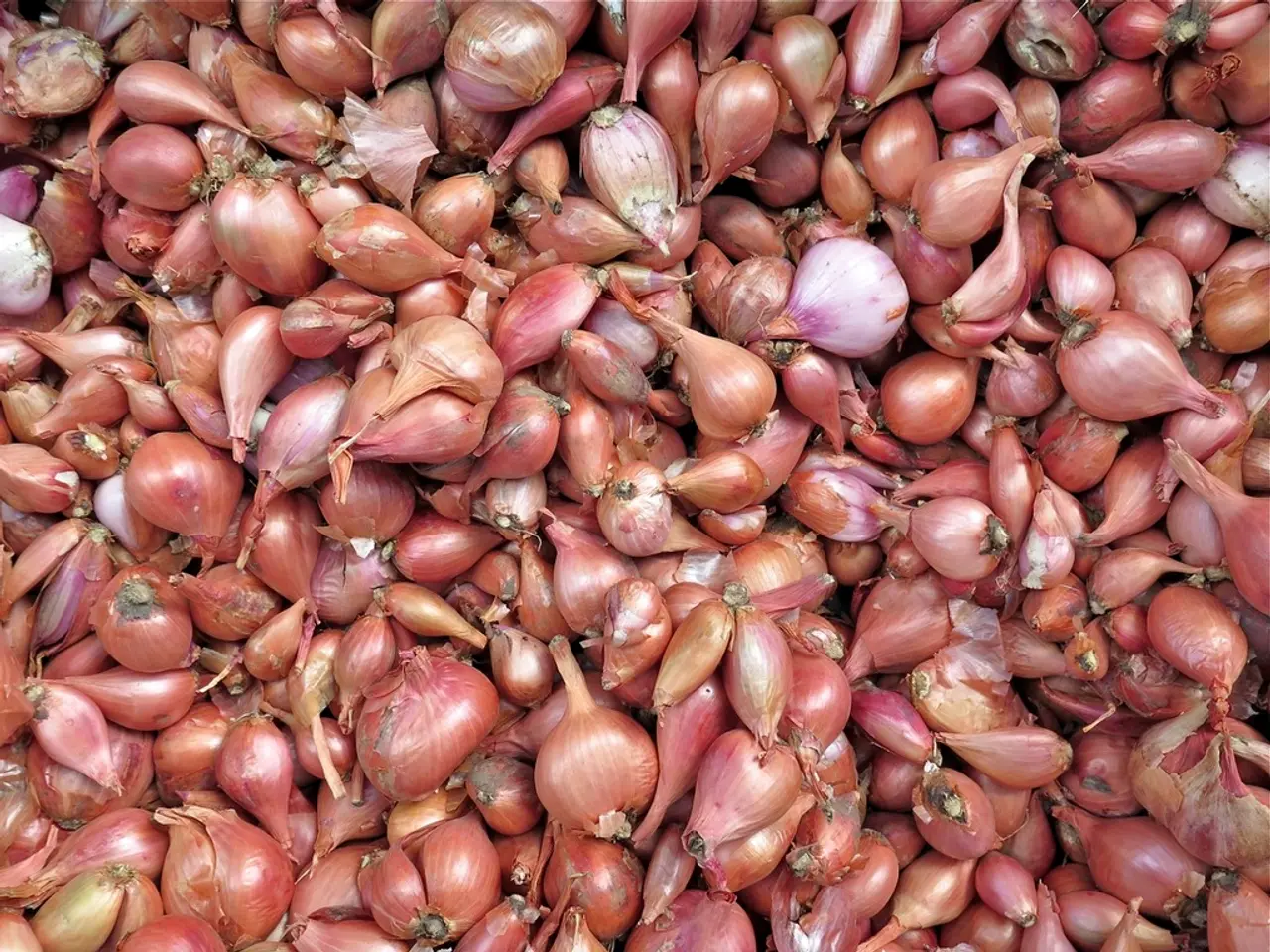Onions Consumption Linked to Lowering Blood Sugar Levels?
In the world of nutrition, onions (Allium cepa L.) have emerged as a promising food for individuals managing diabetes. A study published in the "Avicenna Journal of Phytomedicine" suggests that onions may help manage blood glucose levels in diabetic rats[1].
Other studies, such as those in "Food & Function" and "Journal of Food and Drug Analysis," have found that onions may modulate oxidative stress, reduce the risk of bone disorders, and exhibit antibacterial and antibiofilm agent properties[2][4].
The Cleveland Clinic and the Mayo Clinic have also endorsed onions as part of a healthy diet, citing their nutritional value[3][6]. According to the USDA, raw onions contain nutrients like vitamin C, dietary fibre, and potassium[7].
Onions provide several key benefits for diabetic individuals:
- Blood sugar control: Onions contain sulfur compounds and chromium, which improve insulin sensitivity, aiding better blood sugar regulation[3].
- Anti-inflammatory effects: Chronic inflammation worsens diabetic complications, and onions’ antioxidants like quercetin have strong anti-inflammatory properties that may help reduce this inflammation[2][3].
- Heart health support: Diabetes increases cardiovascular risk, but sulfur compounds and quercetin in onions help lower LDL cholesterol and blood pressure, improving circulation and lowering heart disease risk[3][4].
- Gut health and digestion: Onions are a good source of fibre and prebiotics, supporting gut bacteria that can enhance metabolism and overall digestive health, important for diabetes management[3].
Additional evidence, such as natural remedy recipes combining onions with turmeric and olive oil, suggests that onions may also help flush artery plaque and improve heart protection, further benefiting diabetics[5].
However, it is essential to remember that any dietary change should ideally be discussed with a healthcare professional, especially for individuals on diabetes medication, to avoid hypoglycemia risks.
Moreover, studies like the one conducted by Environmental Health Insights have explored the clinical hypoglycemic effects of Allium cepa (red onion) in type 1 and type 2 diabetic patients[8]. The American Diabetes Association also lists non-starchy vegetables as beneficial for diabetes management[9].
The benefits of onions extend beyond diabetes management. For instance, the "Asia-Pacific Journal of Oncology" suggests a reduced risk of colorectal cancer is associated with the consumption of allium vegetables[10]. UMass Chan Medical School and Mount Sinai also provide valuable information about sulfur, which is found in onions, and the importance of prebiotics, respectively[11][12].
In conclusion, onions offer numerous health benefits for individuals with diabetes, primarily through their ability to help regulate blood sugar levels. By incorporating raw onions into their diet, individuals may experience improved blood sugar control, reduced inflammation, and better heart health. As always, it is crucial to consult a healthcare professional before making significant dietary changes.
[1] https://www.ncbi.nlm.nih.gov/pmc/articles/PMC7850143/ [2] https://www.ncbi.nlm.nih.gov/pmc/articles/PMC6468641/ [3] https://www.clevelandclinic.org/health/foods/14703-onions [4] https://www.ncbi.nlm.nih.gov/pmc/articles/PMC6616375/ [5] https://www.ncbi.nlm.nih.gov/pmc/articles/PMC5735267/ [6] https://www.mayoclinic.org/healthy-lifestyle/nutrition-and-healthy-eating/in-depth/onions/art-20047964 [7] https://fdc.nal.usda.gov/fdc-app.html#/food-details/170352/nutrients [8] https://www.ncbi.nlm.nih.gov/pmc/articles/PMC6173247/ [9] https://www.diabetes.org/food-and-fitness/food/what-can-i-eat/choosing-carbohydrates/non-starchy-vegetables [10] https://www.ncbi.nlm.nih.gov/pmc/articles/PMC5919621/ [11] https://www.mskcc.org/cancer-care/patient-resources/nutrition/sulfur [12] https://www.umassmed.edu/nutrition/nutrition-resources/prebiotics-and-probiotics/
- Science has demonstrated that onions may be beneficial for managing various medical conditions, including chronic diseases such as type-2 diabetes, due to their ability to modulate oxidative stress, improve insulin sensitivity, and aid blood sugar regulation.
- In the realm of health and wellness, fitness and exercise, as well as nutrition, incorporating onions into one's diet could provide additional support for heart health by lowering LDL cholesterol and blood pressure, thereby improving circulation and decreasing heart disease risk.
- Beyond diabetes management, research suggests that consuming onions may reduce the risk of certain medical conditions, such as colorectal cancer, due to their antioxidant properties and fiber content, which enhance gut bacteria metabolism and overall digestive health.




